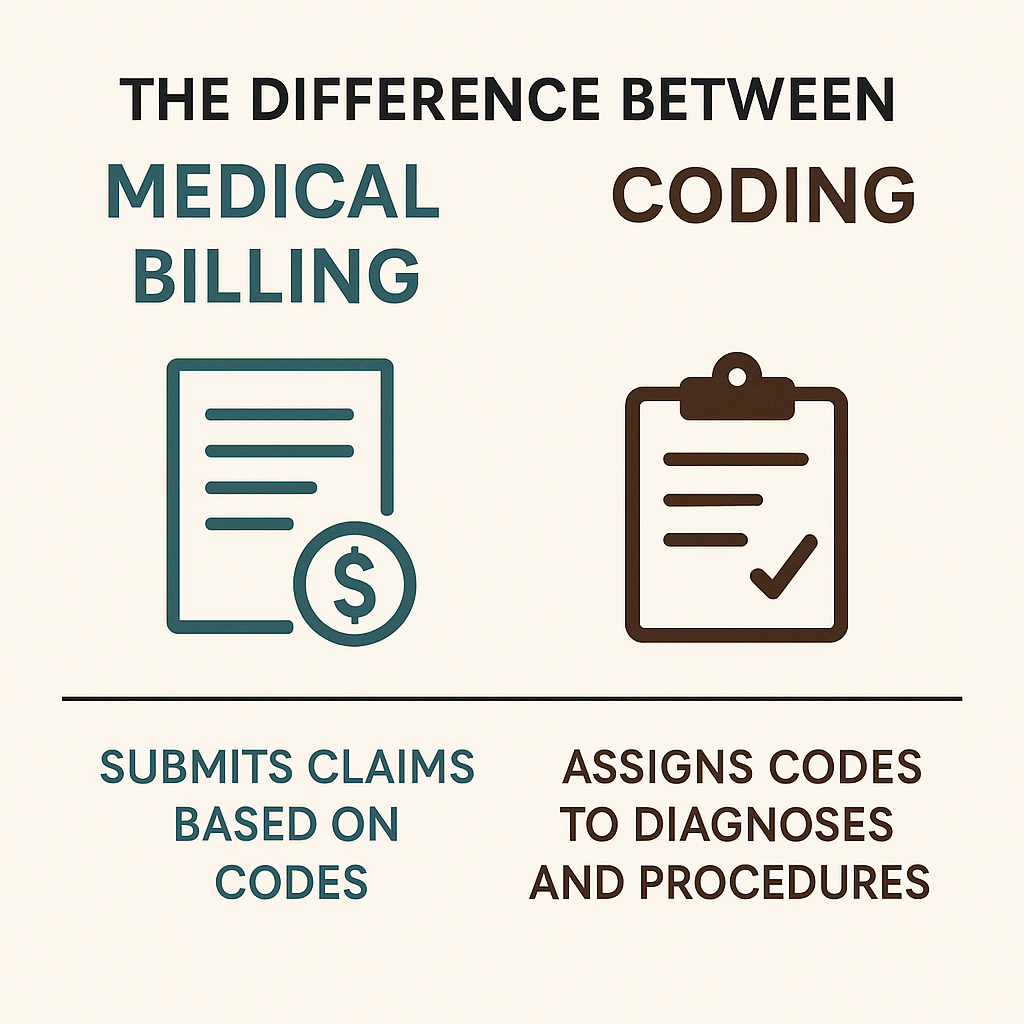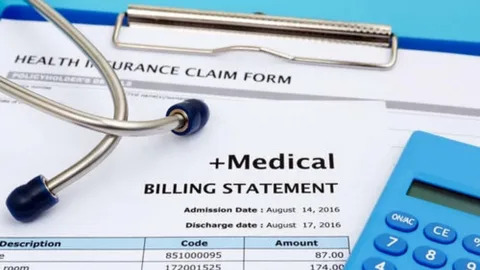
What’s the Difference Between Medical Billing and Coding?
What Is the Difference Between Medical Billing and Coding?
Healthcare is a massive area that doesn't simply rely upon medical doctors and nurses. Behind the scenes, administrative specialists play a vital function, specifically in managing affected man or woman information, payments, and coverage claims. That's where clinical billing and coding come into play.
These two professions frequently get bundled together; however, there’s a clear distinction among the differences between medical billing and coding. Whether you are exploring activity alternatives, looking to study medical billing and coding meaning, or clearly curious about what clinical billing and coding means, this manual will give you the total picture.
Let’s decode the information of billing vs. coding and find out which career route is proper for you.
Understanding Medical Billing and Coding
Medical Coding Explained
Medical coding is the process of translating healthcare diagnoses, procedures, and services into widely wide-spread alphanumeric codes. These codes are used for document-preserving and billing. Common code units include:
-
ICD-10 for diagnoses
-
CPT for procedures
-
HCPCS for supplies and services
A medical coder reviews documentation provided by physicians, interprets medical reports, and applies the appropriate codes. This role requires:
-
Sharp attention to detail
-
Deep knowledge of medical terminology
-
Familiarity with coding manuals and software
Medical billing and coding schooling training regularly begin with coding because it's foundational to every step that follows inside the billing cycle.
Medical Billing Explained
Once the medical coding is done, the information is handed over to the medical biller. Their job is to create a bill or insurance claim using those codes. This includes:
-
Verifying insurance details
-
Submitting claims to insurance companies
-
Handling denials or appeals
-
Communicating with patients and insurers
If coders are the translators, medical billers are the communicators. Their work ensures that the healthcare provider gets reimbursed properly.
Medical Billing vs Coding: The Key Differences
Core Responsibilities
|
Feature |
Medical Coding |
Medical Billing |
|
Primary Task |
Assign medical codes |
Submit insurance claims |
|
Skills Needed |
Medical knowledge, precision |
Communication, multitasking |
|
Tools Used |
Coding manuals, software |
Billing software, insurance portals |
|
Interaction Level |
Low—mostly independent work |
High—frequent interaction with insurers |
|
Outcome |
Accurate documentation |
Reimbursed payments |
Tools Used in Billing vs Coding
Coders rely on tools like
-
ICD-10, CPT, HCPCS manuals
-
Coding software (e.g., 3M Encoder, TruCode)
Billers use:
-
Practice management systems
-
Claim submission portals (Clearinghouses)
-
EHR systems for insurance verification and billing
Workflow Process Differences
A typical medical billing and coding process looks like this:
-
The patient visits a doctor
-
The doctor documents diagnosis and procedures
-
The coder assigns the appropriate codes
-
The biller prepares and submits the insurance claim
-
The insurance company reviews and pays or denies
-
Biller follows up on denials or patient balances
Is Medical Billing and Coding Hard?
This is a common question: is medical billing and coding hard? The answer depends on your learning style and background.
Learning Curve
Both roles require you to:
-
Learn medical terms
-
Understand healthcare systems
-
Memorize and apply complex rules
Coding might be more technical, while billing demands better interpersonal skills.
Work Challenges
Common challenges include:
-
Staying up to date with changing codes and regulations
-
Managing denied claims
-
Ensuring HIPAA compliance
-
Dealing with multiple insurance providers
Despite the demanding situations, many people discover this profession pleasing, especially folks who enjoy trouble-fixing and dependent environments.
Medical Billing vs Coding Salary
Medical Coding Salary
According to industry sources like AAPC:
-
Average salary: $45,000 to $65,000
-
Senior coders or specialists (e.g., surgery coders) can earn $70,000+
Certifications like CPC (Certified Professional Coder) boost earning potential.
Medical Billing Salary
Medical billers earn slightly less on average:
-
Entry-level: $35,000
-
Experienced: $50,000 to $55,000
Those with CPB (Certified Professional Biller) certification often land better-paying roles.
Medical billing vs coding salary clearly shows that coders tend to have higher earning potential, especially with experience and specialization.
Medical Billing vs Coding Career
Medical Coding Career Options
Job titles:
-
Medical Coder
-
Clinical Coder
-
Risk Adjustment Coder
-
Coding Auditor
Coders can work in:
-
Hospitals
-
Private clinics
-
Insurance companies
-
Government agencies
-
Remotely from home
Medical Billing Career Paths
Job titles:
-
Medical Biller
-
Billing Coordinator
-
Insurance Claims Specialist
-
Revenue Cycle Associate
Workplaces include:
-
Physician offices
-
Dental clinics
-
Rehab centers
-
Billing service providers
Medical billing and coding jobs Are expected to develop notably because of healthcare demand, ageing populations, and elevated digitalization.
Medical Billing vs Medical Coding Certification
Certification for Medical Coders
Top credentials include:
-
CPC (AAPC)
-
CCA (AHIMA)
-
CCS (AHIMA)
These certifications show you're trained and qualified in medical billing and coding principles.
Certification for Medical Billers
Popular certifications:
-
CPB (AAPC)
-
CBCS (NHA)
These exams cover billing cycles, claim management, and regulatory guidelines.
Learn Medical Billing and Coding
Best Places for Training
You can learn medical billing and coding through:
-
Community colleges
-
Trade schools
-
Online platforms (AAPC, AHIMA, CareerStep)
Training covers:
-
Medical terminology
-
Coding systems
-
Billing software
-
Insurance processes
Online vs Offline Medical Billing and Coding Courses
Online training benefits:
-
Self-paced
-
Affordable
-
Ideal for working adults
Offline training benefits:
-
Classroom interaction
-
Hands-on practice
-
Peer support
Choose what fits your lifestyle. Both are valid as long as they’re accredited.
Medical Billing vs. Coding: Which to Choose?
Still undecided about medical billing vs. coding—which to choose?
Choose medical coding if:
-
You like detail-oriented tasks
-
Prefer working alone
-
Enjoy reading and interpreting documents
Choose medical billing if:
-
You're good at multitasking
-
Enjoy communication and problem-solving
-
Like working with people
In small practices, many professionals are cross-trained in medical billing and coding, which can increase your value to employers.
Medical Billing and Coding Jobs & Future Scope
The job outlook is bright! According to the U.S. Bureau of Labor Statistics:
-
Growth expected: 8% through 2032
-
High demand in telehealth, remote coding, insurance compliance
You can start your career in a clinic and work your way up to become a coding auditor, billing manager, or even a revenue cycle director.
Final Thoughts on the Meaning of Medical Billing and Coding
Medical billing and coding are crucial careers in modern-day healthcare. The roles are exclusive but complementary. Billers take care of the monetary aspect. Coders manipulate the documentation aspect. Together, they keep the healthcare system strolling smoothly.
If you're detail-oriented, proper with numbers or language, and looking for a steady, far-off, pleasant job, this will be your destiny. Whether you prefer billing vs. coding, each path offers balance, flexibility, and the satisfaction of operating in healthcare—without a scientific degree.
FAQs
What is the fastest way to learn medical billing and coding?
Enroll in a web certification program like AAPC or CareerStep—a few finish in just four to six months.
Can I work from home as a medical biller or coder?
Yes, many professionals work remotely after gaining revel in and certification.
How long does certification take?
Most packages take 6 to twelve months, depending at the course load and your time table.
What’s the best certification for beginners?
For coders: CPC (AAPC). For billers: CPB (AAPC) or CBCS (NHA).
Do billers and coders need to know medical terminology?
Absolutely. A sturdy basis in medical phrases is critical for accuracy and compliance.





